Access to Knowledge in the Age of Intellectual Property
Edited by Gaëlle Krikorian and Amy Kapczynski. Zone Books/MIT Press, 2010. This anthology of thirty-two essays, provides a lucid, intelligent introduction to what is often called the “access to knowledge” movement, or “A2K.” A2K consists of an eclectic set of campaigns that seek to make knowledge and creativity more accessible to ordinary people by limiting the scope of intellectual property law and various technologies of control. In two introductory essays, Krikorian and Kapczynski do a great job of explaining the “conceptual genealogy” of the movement – the legal regimes that govern the flows of knowledge and creativity -- and the inventive strategies and tactics that A2K advocates have developed over the past two decades. With campaigns against “intellectual property” mutating at breakneck speed, Access to Knowledge in the Age of Intellectual Property features chapters by James Love on new “prize” systems to stimulate drug development instead of patents; Lawrence Liang on the “pirate” as the person excluded from participation in the neoliberal economy; Carlos Correa on the special challenges of protecting indigenous and traditional knowledge; Roberto Verzola on the natural abundance of nature and creativity, which technology and law seek to make artificially scarce; and Philippe Aigrain on the rejection of software patents by the European Parliament; among many others. Blog post, "A User's Guide to the IP Wars," January 31, 2011.
The Thing Itself: On the Search for Authenticity
By Richard Todd. Riverhead Books, 2008. Essayist Richard Todd writes: "This book began with a simple feeling, the sense that my life and much of the life around me was not ‘real.’” What does it mean to be “real,” and why do we care about it so much? His twenty-one essays are sparkling, humane meditations on “authenticity” and the false and simulated. Why do we prize an object that has a documented historical provenance over an identical facsimile? Why are the the hyper-real, personal lives of celebrities so compelling to so many people even though the details are so palpably artificial? My blog post, "Authenticity and the Commons, December 10, 2010.
Common As Air: Revolution, Art and Ownership
By Lewis Hyde. Farrar, Straus & Giroux. imagine for a moment if we could learn what the nation's Founders actually thought about the cultural commons as they went about crafting copyright and patent law. Imagine our surprise at learning that Benjamin Franklin was not just an iconic entrepreneur, but in fact America's "founding pirate," deeply committed to collaborative invention and the open sharing of knowledge. Consider the pleasure in discovering that Shakespeare and Shelley, Emerson and Thoreau, and Madison and Jefferson, are all grand figures who believe that creativity and culture properly belong to the commons. You have just imagined Lewis Hyde's brilliant book, Common as Air, which reveals an arc of political history that has been all but obscured by popular mythologies. Hyde mixes scholarly depth with engaging style to give us a daring interpretation of the history of the cultural commons in American life. My blog post: "The Founders as Mashup Mavens."
The Magna Carta Manifesto: Liberties and Commons for All
By Peter Linebaugh. University of California Press, 2008. Radical historian Peter Linebaugh of the University of Toledo has recovered the forgotten history of Magna Carta and the overlooked Charter of the Forest, which together established new legal restraints against tyranny while protecting the subsistence rights of the commoners. The Magna Carta Manifesto is a bracing excavation of the political conflicts between the king and landed classes on the one hand, and the commoners on the other; the importance of "commoning" in the life of ordinary people in the 12th and 13th Centuries, and the mythologies that have been constructed to obscure the real history of Magna Carta. My 2006 blog post on a related Linebaugh essay, "The Magna Carta and Commoners."
The Value of Nothing: How to Reshare Market Society and Redefine Democracy
By Raj Patel. Picador, 2009. The Value of Nothing is a spirited, well-written account of how economists, philosophers and corporations came to create the "free market" ideology that now dominates our political culture. It is also a meditation on the value of the commons as a domain of value that has gone unnoticed and unprotected for too long. Patel, a visiting scholar at UC Berkeley and a long-time food activist, is that rare thinker who is well-versed in economic history and political philosophy as well as a wide range of activist movements such as free software, food sovereignty and shackdwelling in South Africa. My blog post: "The Value of Nothing," June 4, 2010.
Moral Panics and the Copyright Wars
By WIlliam Patry. Oxford University Press, 2009. A trenchant yet highly readable political history of copyright and the deceptive language tricks that gives it so much power today. Thankfully, the book is not another lawyerly disquisition on the labyrinthine complexities of copyright. Rather, it is a no-nonsense lesson on how copyright law has been used over the centuries to defend archaic business models, stymie technological innovation, screw over authors and in our time, to delay the emergence of the Internet-based sharing economy. It is an excellent introduction to the political economy of copyright law and the fierce tactics of language used to justify enclosures of the cultural commons. Blog post, "The Politics of Copyright Law Explained," October 6, 2009.
When Art Worked: The New Deal, Art and Democracy
By Roger Kennedy and David Larkin. Rizzoli, 2010. At a time when our national (and global) predicaments are seen mostly as a matter for economists and policy wonks to solve, historian Roger Kennedy comes forward to remind us of the critical role of art. Art is not just an aesthetic pleasure or indulgence, he insists; it is a way in which people makes sense of their problems and re-imagine the common good. When Art Worked is a sumptuous immersion in the murals, music, paintings, photographs, posters, architecture, monuments, civic parks, books and travel guides, and countless other artifacts of public culture sponsored by Franklin Delano Roosevelt’s New Deal. Kennedy writes that the arts "contributed mightily to building public support for the renewal of federal civil rights legislation, for Horace Albright’s reorganization of the National Park System, for the preservation and protection of other common ground, and for John Collier’s transformation of federal Indian programs." My blog post, "When Art Worked."
A Paradise Built in Hell: The Extraordinary Communities That Arise in Disaster
By Rebecca Solnit. Viking, 2009. How is it possible that human beings are capable of such spontaneous altruism, resourcefulness and joy when faced with disaster? Why, in the midst of earthquakes and fires, do people so intuitively self-organize themselves into communities of mutual aid, opening their hearts to utter strangers and sharing each other’s burdens and joys? Author and essayist Rebecca Solnit’s book, A Paradise Built in Hell, is an absorbing empirical rebuttal to the cynics who see only the worst of humanity. Her book is a lyrically written yet hard-nosed answer to the economists and political leaders believe that the world is comprised of isolated, selfish individuals who must be governed through authoritarianism and fear. My blog post, March 24, 2010.
The Great Transformation: The Political and Economic Origins of Our Time
By Karl Polanyi. Beacon Press, 2001. Prior of the rise of "the market" as an ordering principle for society, politics, religion and social norms were the prevailing forces of governance. Land, labor and money itself were not regarded chiefly as commodities to be bought and sold. They were "embedded" in social relationships, and subject to moral consideration, religious beliefs and community management. When the Great Transformation occurred, Polanyi argued, markets became regarded as autonomous forces in their own right. The presumption was that "market forces" should organize all of society. We have been dealing with its consequences ever since. This book is a classic is sketching the historic transition from the world of medieval commons to the age of market enclosure that prevails to this day. My blog post: "Why Karl Polanyi Still Matters."
Math You Can't Use: Patents, Copyright and Software
By Ben Klemens. Brookings Institution, 2005. Should the government be in the business of granting legally protecting monopolies on abstract ideas such as “business methods” and mathematical algorithms? This book shows how copyrights and patents have made all sorts of mathematical formulas illegal, to the detriment of research, discovery and creativity.

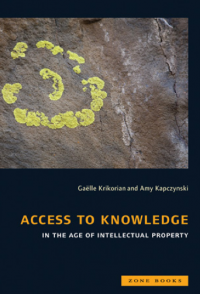
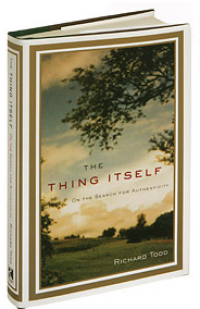
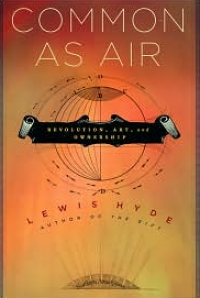
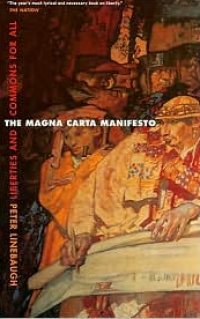
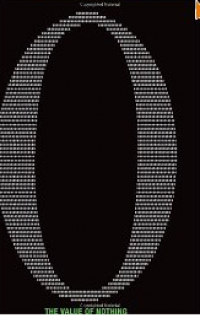
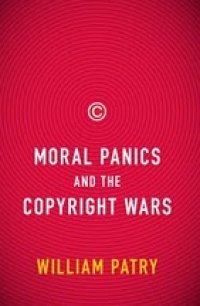
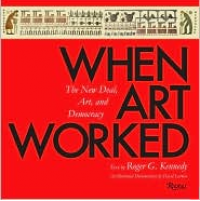
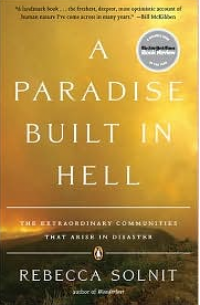
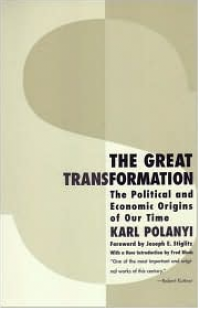
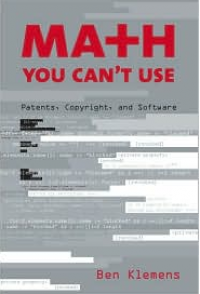










Recent comments